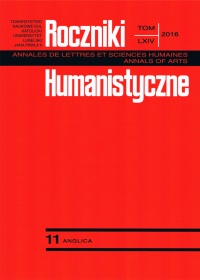Investigating EFL learners’ situational and perceived interest in reading different types of texts
Abstract
This paper reports a classroom-based empirical study that aimed to establish the level of situational and perceived interest generated by EFL learners while reading three types of texts (General Comprehension, Culture Focus and Narrative texts). Situational interest was defined as comprising five Sources of Interest, that is Text Cohesion, Prior Knowledge, Engagement, Ease of Recollection, and Emotiveness. The analysis of the students’ ratings of the questionnaire statements for the particular texts has revealed the main effect of Text Type, with the highest level of the students’ interest gained for Narrative texts. The level of interest was also dependent on Sources of Interest, with the highest mean gained for Cohesion. Narrative was the type of text perceived by the students as the most interesting of the three they worked with. The results of the study showed that the role of situational and perceived interest in reading different text types needs to be adequately approached by FL specialists as a vital factor in reading and learning tasks.
References
Alexander, Patricia A., and Tamara L. Jetton. 1996. “The role of importance and interest in the processing of text.” Educational Psychology Review 8(1): 89–121.
Alexander, Patricia A., and Tamara L. Jetton. 2000. “Learning from text: A multidimensional and developmental perspective.” In Handbook of reading research, edited by Michael L. Kamil, Peter B. Mosenthal, P. David Pearson, and Rebecca Barr, 285–310. Mahwah, N.J.: Lawrence Earlbaum.
Anderman, Eric M., and Christopher A. Wolters. 2006. “Goals, values, and affect: Influences on student motivation.” In Handbook of educational psychology. Second edition, edited by Patricia A. Alexander, and Philip H. Winne, 369–389. New York: Routledge.
Boscolo, Pietro, and Lucia Mason. 2003. “Topic knowledge, text coherence, and interest: How they interact in learning from instructional texts.” The Journal of Experimental Education 71(2): 126–148.
Brantmeier, Cindy. 2006. “Toward a multicomponent model of interest and L2 reading: Sources of interest, perceived situational interest, and comprehension.” Reading in a Foreign Language 18(2): 89–115.
Carr, Martha, Nancy B. Mizelle, and David Charak. 1998. “Motivation to read and learn from text.” In Learning from text across conceptual domains, edited by Cynthia R. Hynd, 45–70. Mahwah, NJ: Lawrence Erlbaum.
Chodkiewicz, Halina. 2016. “On texts interesting to read in foreign language teaching.” In Working with text and around text in foreign language environments, edited by Halina Chodkiewicz, Piotr Steinbrich, and Małgorzata Krzemińska, 39–56. Berlin Heidelberg: Springer.
Conradi, Kristin, Bong Gee Jang, and Michael C. McKenna. 2014. “Motivation terminology in reading research: A conceptual review.” Educational Psychological Review 26: 127–164.
Dakowska, Maria. 2015. In search of processes of language use in foreign language didactics. Frankfurt am Main: Peter Lang.
Day, Richard R. 1994. “Selecting a passage for the EFL reading class.” English Teaching Forum 32: 20–27.
Harmer, Jeremy. 2012. Teacher knowledge. Core concepts in English Language Teaching. Harlow: Pearson Education.
Hedge, Tricia. 2000. Teaching and learning in the language classroom. Oxford: Oxford University Press.
Hidi, Suzanne, and Valerie Anderson. 1992. “Situational interest and its impact on reading expository writing.” In The role of interest in learning and development, edited by K. Ann Renninger, Suzanne Hidi, and Andreas Krapp, 215–238. Hillsdale, NJ: Lawrence Earlbaum
Krapp, Andreas, Suzanne Hidi, and K. Ann Renninger. 1992. “Interest, learning and development.” In The role of interest in learning and development, edited by K. Ann Renninger, Suzanne Hidi, and Andreas Krapp, 3–25. Hillsdale, NJ: Erlbaum.
Krapp, Andreas, and Manfred Prenzel. 2011. “Research on interest in science: Theories, methods, and findings.” International Journal of Science Education, 33(1): 27–50.
Nation, Ian Stephen Paul. 2008. Teaching ESL/EFL reading and writing. New York: Routledge.
Renninger, K. Ann, and Suzanne Hidi. 2011. “Revisiting the conceptualization, measurement, and generation of interest.” Educational Psychologist 46(3): 168–184.
Schraw, Gregory, Roger Bruning, and Carla Svoboda. 1995. “Sources of situational interest.” Journal of Reading Behaviour 27: 1–17.
Wade, Suzanne E., and Robert B. Adams. 1990. “Effects of importance and interest on recall of biographical text.” Journal of Literacy Research 22(4): 331–353.
Wade, Suzanne E., William M. Buxton, and Michelle Kelly. 1999. “Using think‐alouds to examine reader‐text interest.” Reading Research Quarterly 34(2): 194–216.
Ur, Penny. 1996. A course in language teaching. Cambridge: Cambridge University Press
Copyright (c) 2016 Roczniki Humanistyczne

This work is licensed under a Creative Commons Attribution-NonCommercial-NoDerivatives 4.0 International License.





